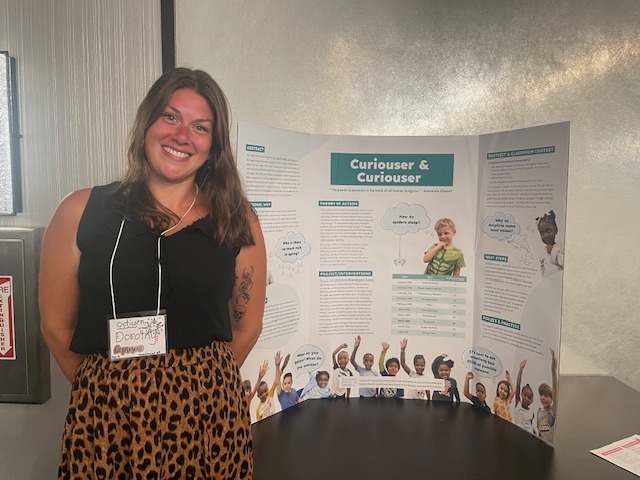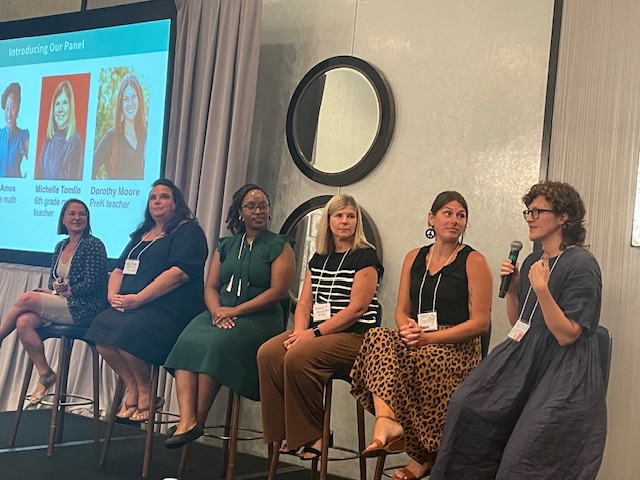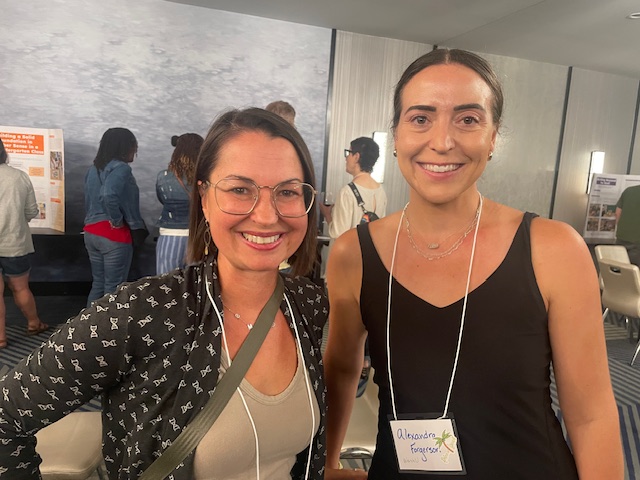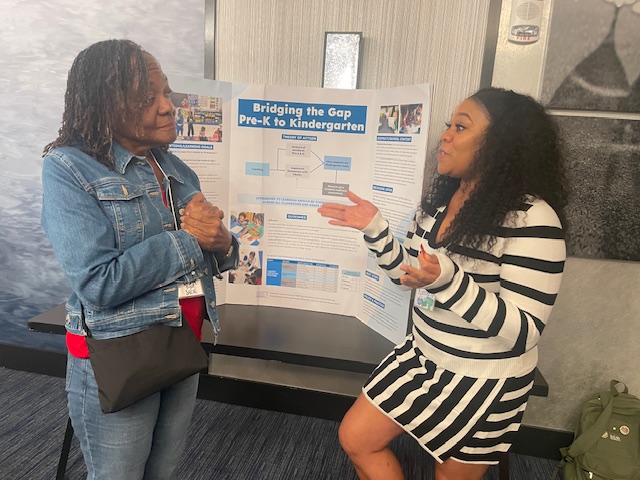
Teacher Dorothy Moore has no doubts about her career choice.
In fact, she sees her role as an early childhood educator at Garrett Elementary School in the Hazelwood School District as more vital and full of possibility than ever.
“I couldn’t feel more like I’m where I’m supposed to be,” Moore says. “Not everybody has that opportunity to be so inspirational and inspired at the same time.”
As Moore gears up for the start of another school year, she sees herself not only as a teacher, but also a leader. A teacher leader.
Moore’s newfound path toward leadership started while participating in Math314, a program of WashU’s Institute for School Partnership (ISP). In 2024-2025, the ISP secured a three-year grant to study and expand previous pilot work in the early childhood space, launching a new research-practice partnership project with the Hazelwood School District. The primary goal of the partnership is to support early childhood teachers in creating learning environments where all students are provided equitable access to mathematics.
“Math314 combines research-based professional development modules with the ISP’s partnership-centered, systems-level approach to improve mathematics teaching,” says Carmen Stayton, program director. “Rigorous early childhood math education is vital for students’ future academic and lifelong success. This research-practice partnership with Hazelwood is designed to support educational leaders and teachers who aim to provide high-quality math instruction for early childhood learners in their schools and districts.”
By working with the Math314 team last year, Moore connected with teaching peers in new ways as they tackled shared goals and challenges.
“This was a really inspirational group of people,” she says. “I always left these meetings energized. I never thought I’d be driven to join a group like that, or be invited to think of myself as a leader.”
As the school year moved ahead, Moore was asked to lean even more into exploring problems of practice deeply. She participated in the ISP’s third annual Practical Research in Education Showcase held on Washington University’s Danforth Campus in May 2025, joining peers from her own district and others who had collaborated with the ISP to investigate problems of practice. Participants shared posters on their research with researchers, faculty members, higher education administrators, community members, and other educators from across the St. Louis region. Moore’s research centered around encouraging students to share questions in the classroom setting without fear or discouragement.

“As students grow older, they start to become more fearful of asking questions,” Moore says. “It’s never hard to get PreK students to ask questions, but I wanted to explore what could be the impact of having intentional, dedicated time in the classroom.”
Beginning in January, Moore initiated the intentional time for questions. She set a timer, recorded the questions, and throughout the week, together with the students, worked on finding the answers in any number of ways.
“It’s my hope that by having intentional question time early, students will be more confident asking questions going forward and that they’ll be supportive of their peers when they have questions. I’d like to partner with teachers in my building to study if what I’m doing is making a difference.”
Moore and a handful of other teachers participating in RPP work through ISP programs were invited to engage even more deeply with a broader national audience by attending an annual forum co-hosted by the ISP and the National Network for Education Research-Practice Partnerships (NNERPP) held July 23-25, 2025 on WashU’s Danforth Campus.
Elevating teacher voice to a national audience
Bringing collaborative partners in education along for even deeper engagement and operating in a research-practice partnership (RPP) context has long been a comfortable space for the ISP, says Associate Director Rachel Ruggirello, pointing to signature programs mySci and Math314.

“Listening to and meaningfully engaging with these committed leaders as they articulate authentic needs, we can support them to incorporate research evidence into their practice, while also facilitating research that is practically relevant and actionable,” says Ruggirello, who was excited to welcome NNERPP- affiliated RPPs nationwide to St. Louis.
Once the ISP was selected to serve as co-host for the Forum, the team started brainstorming about ways to give participants a warm welcome.
“At the ISP, we emphasize equitable RPPs that elevate educator voices. It was fitting to welcome the NNERPP community with an interactive poster session and panel featuring our teacher researchers. This event showcased how our collective efforts are advancing educational practices locally while generating meaningful knowledge. After the opening event, teachers were encouraged to participate in the forum, to connect and engage in joyful and meaningful learning in collaboration with the NNERPP community.”
Seven teacher researchers joined Moore to present posters during the opening event of the 2025 NNERPP Forum, including three PreK teachers from the Hazelwood School District (John Webb, Kimberly Reese, and Ambrozine Choice); three teachers from the Ritenour School District (Camille Morgan–7th grade math, Mandy Harvell– Project Lead The Way, and Monica Amos–8th grade math) and Kirkwood School District’s Michelle Tomlin, sixth grade math.
Hoech Middle School teacher Monica Amos joined Moore, Tomlin, Harvell and the ISP’s Rachel Ruggirello and Alison Brockhouse for a teacher researcher panel during the opening event.
“With the poster presentations, I was so shocked at how interested everyone from the conference was,” says Amos.
“The way they were looking at my research and asking really engaging questions about my work and my students was extremely powerful. My teacher and math heart was full. They cared about what we’re doing. What we’re doing matters!”
Monica Amos, math teacher, Hoech Middle School
“The way they were looking at my research and asking really engaging questions about my work and my students was extremely powerful. My teacher and math heart was full. They cared about what we’re doing. What we’re doing matters!”
Both Amos and Moore found participating in the panel empowering as well.
“When they asked us to be a part of the panel, initially, I didn’t think I was good enough for something like that,” says Moore. “Then I decided, no, I want to do this. I’m going to put myself in new situations for growth and see what happens. Moving forward, I’m keeping an open mind. Just say yes!”
Amos agrees.
“As leaders in our profession, when you get into mainstream conversations, nobody ever asks us about this kind of deep work. I would do a panel again, not just for myself, but to advocate for my students and their needs.”
